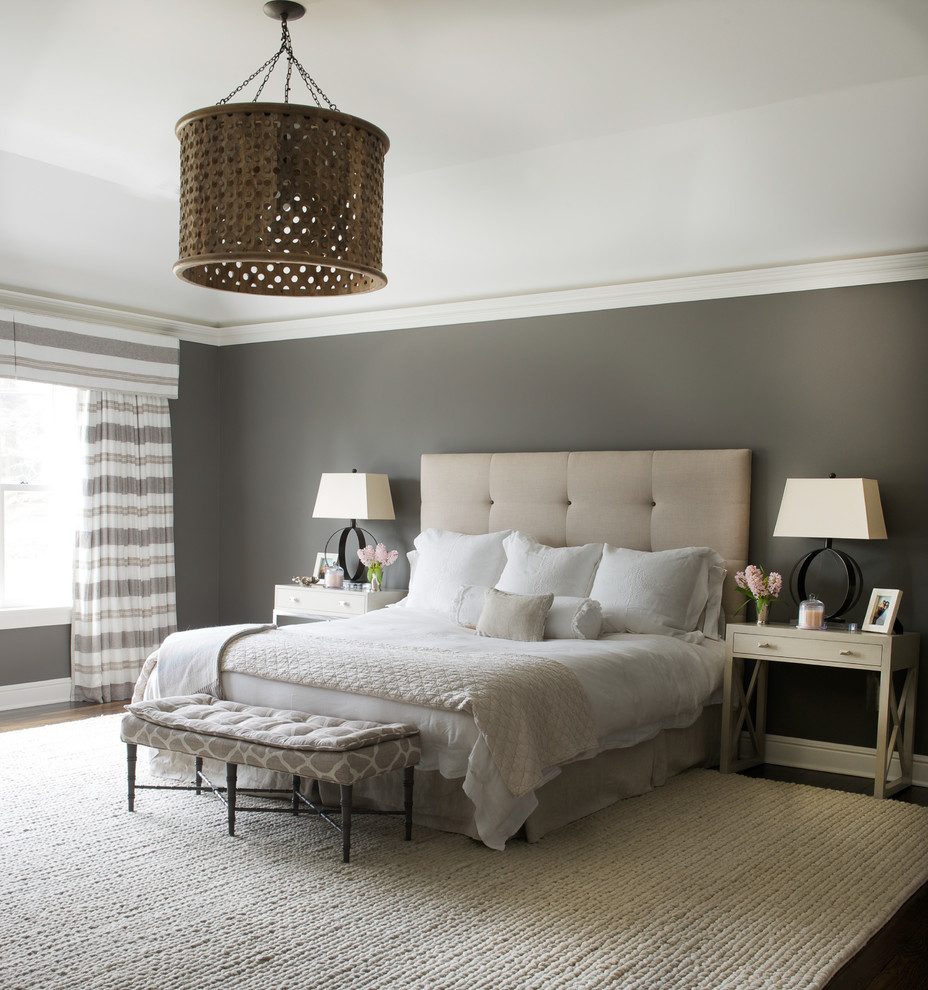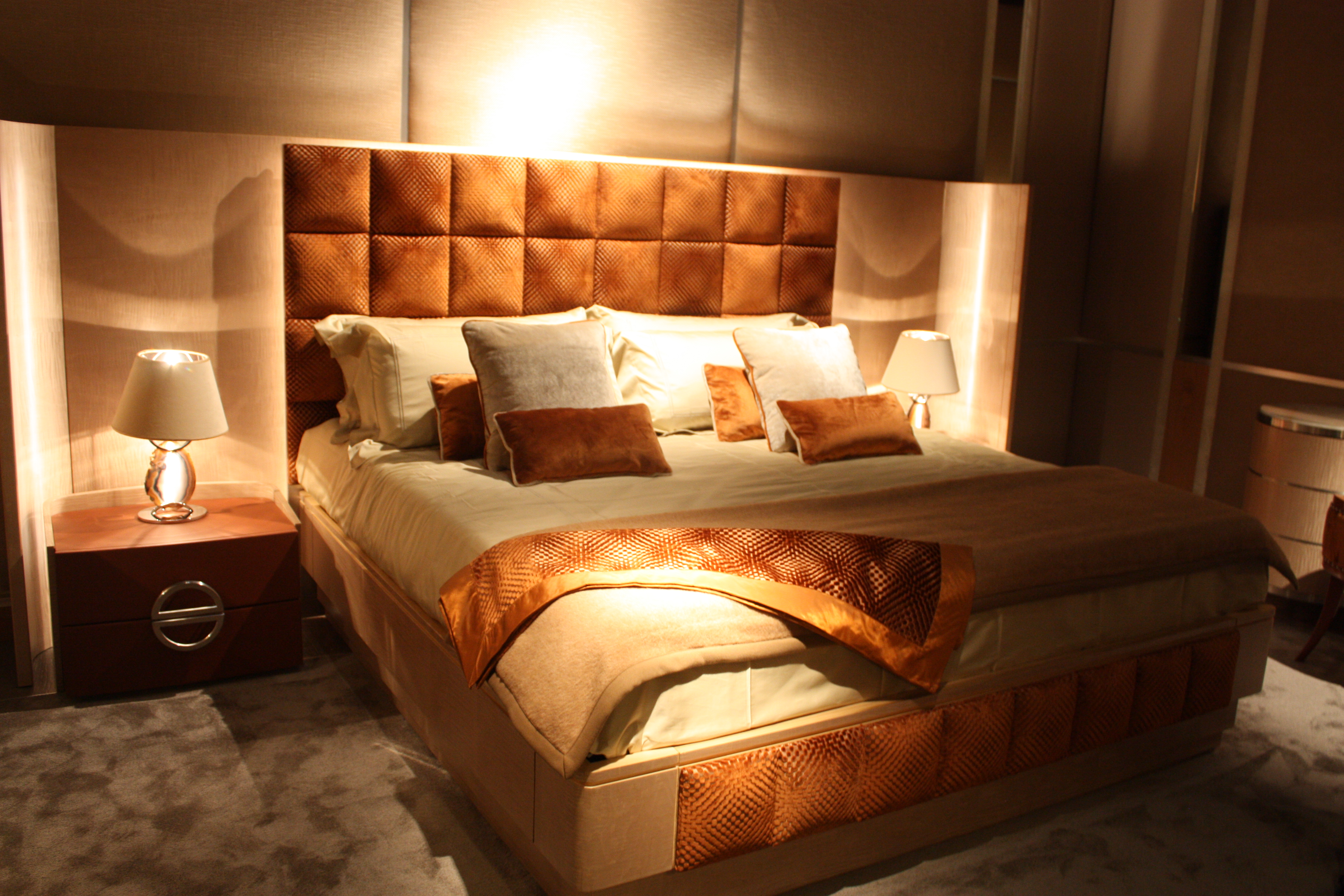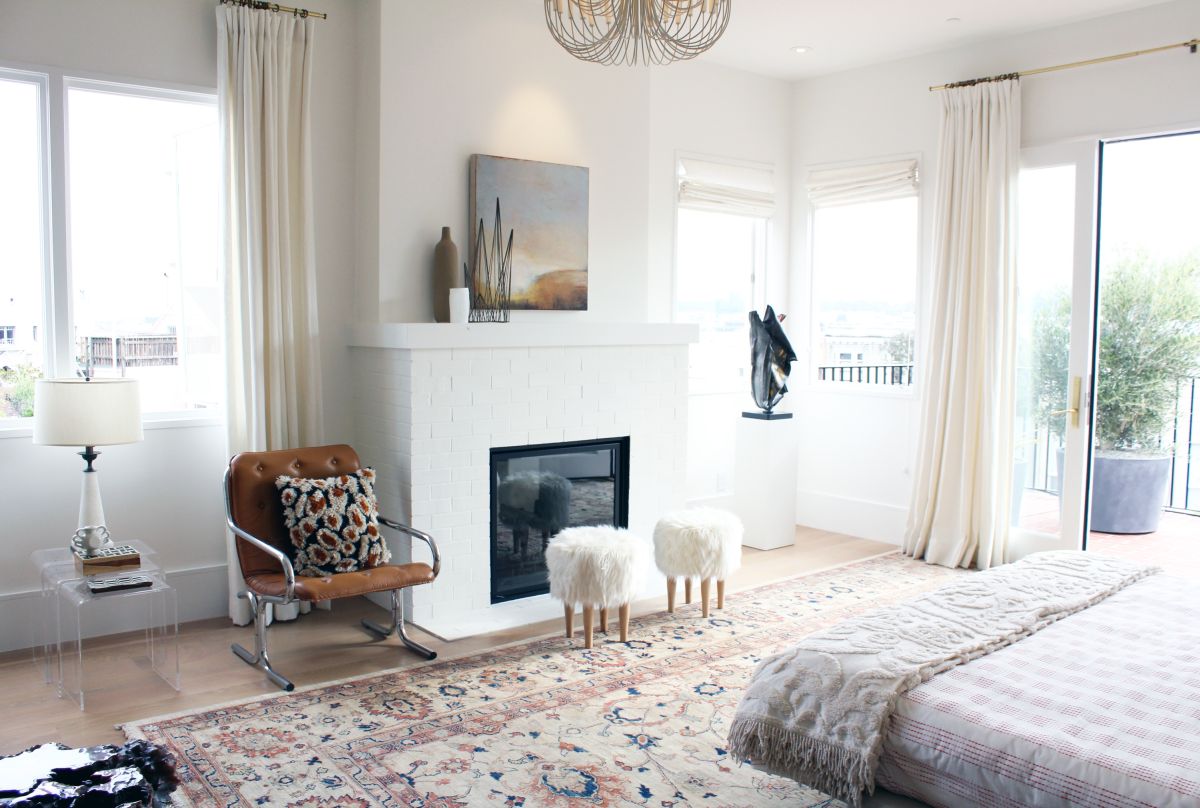Feng shui, an ancient Chinese method and science of spatial arrangement, helps people to design a balanced home and be happier, healthier, and more successful as a result. The bedroom is particularly important in feng shui because the bedroom is a sanctuary of sorts. In the bedroom, we’ll focus this article on the primary furnishing: the bed. Feng shui has guidelines about the bed that will impact the qi (positive energy or life force) of your entire bedroom, whether or not you do anything else. Here are some of those ideas:
Easy Ways to Apply Feng Shui to Your Bedroom
Position the bed as far away from the door as possible.
In feng shui, this is called the “commanding position” for the bed – away from but facing the door. It keeps you away from the hustle and bustle of the outside (e.g., everything outside your safe space), but more important than that, this bed positioning and placement helps to provide respite for your survival mechanisms, which are active 24 hours a day even while you sleep.
When you are sleeping, your body is in what’s called a yin state. During all of those hours you are asleep each night, it’s important to protect your body during this time, as it’s more susceptible to the energy around you while in this state. Where a commanding position is not possible due to your bedroom’s layout, you can add a mirror to reflect the doorway. A freestanding mirror is ideal for this, as you can just adjust the angle of it to meet your needs.
Position the bed so it faces the door but is not in direct line with it.
When you can easily see the bedroom door from the comfort and safety of your bed, it helps your survival instincts to be able to relax a little. You can see who’s entering the room and have time to react, which helps to sustain a feeling of control over your life as a rule. This is key in having your feng shui bedroom be a calming and secure retreat from the world.
Ideally, the bed in a feng shui bedroom will be positioned near the corner of the room that’s diagonally opposite the bedroom door. This provides (a) distance from the door, and (b) full view of the door, and (c) no direct alignment with the door. These three factors are conducive to sleep and optimal for a bedroom’s sense of security and relaxation.
Position the bed with its headboard against a solid wall.
This advice is actually part of the bed’s “commanding position” in feng shui. We’ll discuss the importance of a good, solid headboard in a minute, but for now, we’re focusing on bed placement and positioning. A solid wall supporting your bed’s headboard helps you to feel secure and not vulnerable. If this isn’t possible in your bedroom, fake it by placing a folding screen or some other “wall” type piece behind the bed.
Another feng shui suggestion is to always avoid your headboard being placed by a wall that has a toilet on the other side. The toilet shouldn’t lie on the other side of your head. If this is not possible, once again, a mirror can assist with removing the energy of the toilet. Place a mirror above your bed on the wall behind it.
Avoid using a footboard, with one exception.
A footboard is viewed as a barrier to qi’s flow, so it should be avoided in most instances for good feng shui. However, if your bed happens to be positioned with your feet pointing toward the door (known as the “death position” in feng shui and to be avoided whenever possible), a footboard or substantial piece of furniture at the foot of your bed will help to provide a buffer or protection from the drain of life force.
Do not position the bed under a window.
When you sleep with the bed under a window, personal qi tends to grow weaker and ultimately decrease. This is because energy flows out the window, rather than surrounds you protectively while in your bed. In feng shui, it’s believed this is particularly important if you have a ground floor bedroom or suffer from issues with your eyes. Always try to have a solid wall behind you, to give you the necessary support.
Make sure your bed is at an appropriate height.
The exact height of your bed will depend upon your body type and build – even the staunchest feng shui followers provide variability for customized placement here. The top of the mattress should hit around mid-thigh – this is not so low that you have to crouch to crawl into bed, but neither is it so high that you must jump or find a stool.
In an ideal world, your mattress will be roughly eighteen inches from the floor, with nothing underneath it. You won’t want an extremely high bed for good feng shui, as that stops you from feeling grounded when sleeping in it. The earth element is so important in feng shui, and you won’t feel the benefits of it if you are lifted too high off the ground. When you are sleeping in a high bed, you take on the feeling of being in the air, which can make you feel insecure.
Choose a bed with empty space underneath.
Remember that the goal is a positive energy flow around the bed (and, thus, yourself when you’re sleeping), which also means under the bed. To allow for this, the bed needs to be up off the bed at a reasonable height. (Note: Although efficient in the storage department, beds with built-in drawers underneath are not considered good feng shui for this reason.)
Use a wood headboard.
In feng shui, the best headboard is a solid headboard. Preferred are headboards built out of wood, because the strength and support that is provided to your head are reassuring. Wood headboards are recommended specifically because of wood’s natural strength and grounding support.
Wood is one of the five feng shui elements, along with metal, water, fire, and earth. If wood is in balance in your home, it can represent trust, stillness, growth, and new ideas. While a wood headboard is one way to add this element into your room, you can also use artwork and shapes within your room to represent this element instead of physical wood. Many people opt to add touches of blue and green to represent wood or artwork with flowers and plants.
If not wood, use an upholstered headboard.
Upholstered headboards are also recommended because they are solid but also supportive and softer than wood. This is a good balance, which feng shui is all about. Both consciously and subconsciously, your head should always be protected and supported, which is what a solid headboard provides (not just on a physical or literal level, but also on a mental, emotional, and spiritual level).
Use a supportive mattress.
Most of us spend about a third of our lives asleep (or, at least, we try to). If that sleep is done on a lumpy, creviced, or otherwise uncomfortable and unsupportive mattress, it isn’t going to be nearly as restful and restorative as it should be for our health and well-being. Good feng shui recommends that mattresses are not bought secondhand, because the used mattresses can potentially introduce lots of poor health germs and/or negative energy.
Another consideration is the size of your mattress. If you are single and aren’t looking for anything currently, use whatever size mattress you desire. For anyone in a relationship, avoid a mattress with two box springs. It’s believed this type of mattress can disrupt the energy flow in your relationship, causing damage to your partnership. Don’t buy a very large mattress either, as a king mattress can minimize intimacy in a relationship. A queen mattress is the largest recommended size in feng shui.
Position the bed with space on both sides.
Don’t push your bed up against a wall; instead, position it so that each person sleeping on the bed can get in and out of bed easily without disturbing the other. This also helps to keep the positive energy flow around the bed. If one side of the bed is “trapped” against a wall, feng shui finds that to be a gloomy metaphor for the direction of the relationship of the couple who sleep there.
Keep the area around the bed free of clutter.
With your feng shui bed having plenty of space surrounding it to enable qi’s uninterrupted flow, your responsibility now comes to keep the space clear. Avoid the temptation to toss clothes on the floor around the bed, or lay down the laptop or a stack of books or magazines. This type of clutter is disturbing and distracting, and the qi is unable to circulate satisfactorily in such a setting.
Clutter is a form of low energy, which drains more energy from the individual sleeping in the bedroom. As it blocks the flow of energy around your room, it can negatively impact events in your life. Remove any items that visually clutter your bedroom and that don’t need to be within this room. This includes televisions and computers, which are best kept elsewhere in your home. Avoid throwing items under your bed or into your closet to hide them. Finally, make sure you have a good sort through your closet and remove any items that you don’t regularly wear.
Balance energy on both sides of the bed.
Grounding and balanced items on both sides of the bed, such as nightstands and/or some sort of lighting, will help to keep you centered, secure, and relaxed. This is especially important for a relationship to share equally in the surroundings.
It’s recommended in feng shui to always have two bedside nightstands – one on either side of the bed. This promotes romance and love between couples and invites this energy into the bedroom. One bedside table would suggest a single person lives in that room instead of a couple. Your room will look and feel more balanced from the addition of two nightstands, but ensure they don’t become a cluttered surface in your bedroom.
Use round or curved nightstands.
While this isn’t always possible, good feng shui recommends that square or hard-angled nightstands be avoided. Instead, opt for nightstands with curved edges to facilitate the positive and seamless energy flow around the space. Hard angles, in feng shui, are believed to be like “poison arrows,” shooting negative energy directly at a place.
These hard angles suggest danger in feng shui and can make individuals feel unsafe or irritable. As most architecture and rooms today feature corners, this needs to be balanced with curved edges in your bedroom. Any furniture you add to your bedroom should be rounded, which will give you a feeling of safety and comfort. If you do have items of furniture with sharper edges, add fabric over them to soften the corners. Alternatively, you can turn the item onto a diagonal, which will reduce the effect of the sharp edges. Room corners can be filled with plants, lamps, art, or furniture, which will help to soften the corner and energy.
Amateur Corner: Real-Life Application for a Feng Shui Bed
In this master bedroom, there are quite a few feng shui violations that can easily be taken care of. Of course, many feng shui changes can be incorporated into this space, but let’s just look at how a few minutes of following feng shui guidelines can help immensely.
Both nightstand surfaces are completely cluttered. This one has books, receipts, miscellaneous paper, and writing utensils, jewelry, and an enormous and unsightly water bottle.
The second nightstand is similarly adorned. Too much stuff piled high. The good news is that the nightstands are equal, and there is space on both sides of the bed so nobody is feeling “trapped.” It’s important to clear the clutter from areas of your home where you spend the most time. With the number of hours we spend each day in our bedrooms, clearing clutter from this area is essential. This can shift the energy in your bedroom, creating a more positive experience and possibly increasing productivity after a good night’s sleep. It’s hard to sleep with clutter surrounding you, as it’s alerting you to the fact that things need to be done in your home. This is even believed to cause you long-term stress and impact your health if that negative energy is present for a long time.
I took literally less than 5 minutes to declutter the nightstand tops. This isn’t a photo-op; everything else that was on top of the nightstand was put in its rightful place and/or recycled or thrown away as appropriate. And now we can see the pretty marble top and notice the brass pull. Note that, although the nightstand itself isn’t rounded, a few round details help to smooth out the area’s right angles.
This second nightstand requires only reading material. To be honest, the TV remote will likely end up on top of the nightstand, too (gasp! A TV in the bedroom?! A feng shui no-no, I freely admit.), but it fits just fine in the nightstand drawer for right now.
While the bed in feng shui is supposed to be positioned against a solid wall, that is literally not possible in this master bedroom because of multiple large windows on the only possible bed walls. As a solution, however, I pulled down the burlap roman shade above the bed. This actually does have a tangibly different (e.g., safer, cozier, and more secure) feel.
The final quick feng shui incorporation I did was to make the bed, spreading the bold striped throw along the foot of the bed. The bedroom door opens just inches away from the corner of the bed, so a footboard or other furniture piece won’t fit. Instead, I choose to use the visual boldness of this stripe (lying horizontally) to serve as a barrier between the outside-bedroom qi and within the bedroom. I think these few changes, done over 10 minutes, have made a significant impact on the restful vibe of the bedroom overall.
Feng Shui Bedroom Colors
While considering the placement of items is essential for your bedroom, the color scheme you opt for is also important to consider in feng shui. The best colors for your bedroom are designated by the Bagua area that your bedroom is located in. This is an energy map of any space in feng shui, which will help you decide how to decorate your rooms. For a safe color choice for your bedroom, opt for skin tones, which can be anything from light porcelain tones all the way to rich chocolate brown colors. Alternatively, for a personal touch, you can choose your bedroom color based on your birth element in feng shui. You can layer colors within your room by using light to darker tones throughout your room.
Artwork in Your Bedroom
Recommendations for art in the bedroom in feng shui are based on whether you are single or in a relationship. For couples, the double happiness symbol is recommended, or alternatively, birds are a great option for a painting. Birds always need to be displayed in a pair, and they are a symbol of love within marriage. For the best placement, add them to the southwest corner of your room. You can also add a mystic knot somewhere in your room, which can be combined with other symbols of feng shui.
Singles can use the same artwork as mentioned above, as this may help to attract love into their lives. Rose quartz is an ideal addition to a single person’s bedroom and is best added in the form of two hearts in the southwest corner of your room. A pair of elephants can also make a good piece of art, but their trunks must always face upwards. Finally, for single women, consider red peonies, which symbolize a woman seeking a partner.
Adding feng shui to your bedroom takes a little thought and effort but is well worth it to cultivate good energy in a room we spend so much of our lives in. The placement of your bed is your number one priority, followed by the elements listed later. Clutter should be minimized where possible to create a peaceful and harmonious space to sleep in each night. Of course, you can still enjoy art and decorations throughout your room as recommended, which will add a personal touch to your new bedroom design and layout.
The post Feng Shui in the Bedroom: All About the Bed appeared first on Home Decorating Trends - Homedit.

























0 Commentaires